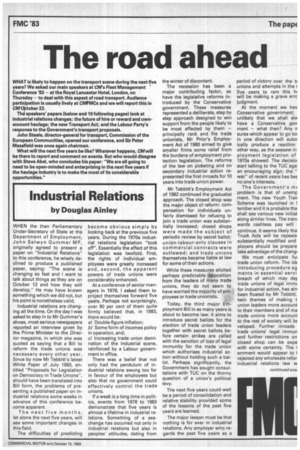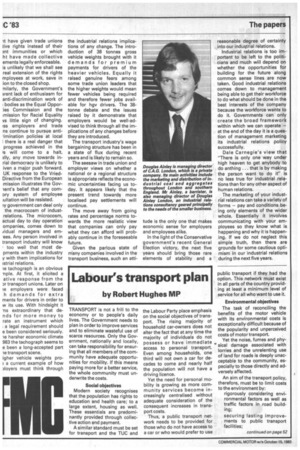Industrial Relations
Page 51

Page 52

If you've noticed an error in this article please click here to report it so we can fix it.
by Douglas Ainley
WHEN the then Parliamentary Under-Secretary of State at the Department of Employment, John Selwyn Gummer MP, originally agreed to present a paper on "Industrial Relations" to this conference, he wisely declined to produce a published paper, saying: "The scene is changing so fast and I want to talk about things as they are on October 13 and how they will develop." He may have known something which we did not, but his point is nonetheless valid.
Industrial relations are changing all the time. On the day I was asked to step in to Mr Gummers shoes, most serious newspapers reported an interview given by the Prime Minister to the Director magazine, in which she was quoted as saying that a Bill to reform the trade unions was necessary every other year. Since by now Mr Tebbitt's latest White Paper of July 1983, entitled "Proposals for Legislation on Democracy in Trade Unions", should have been translated into Bill form, the problems of presenting a published paper on industrial relations some weeks in advance of this conference become apparent.
The next five months, let alone the next five years, will see some important changes in this field.
The difficulties of predicting become obvious simply by looking back at the previous five years. During the 1970s industrial relations legislation "took off". Essentially the effect of this legislation was twofold. First, the rights of individual employees were greatly increased and, second, the apparent powers . of trade unions were considerably enhanced.
At a conference of senior managers in 1978, I asked them to project themselves forward five years. Perhaps not surprisingly, over 90 per cent of them quite firmly believed that, in 1983, there would be: a) Double-figure inflation; b) Some form of incomes policy in operation, and; c) Increasing trade union domination of the industrial scene, reinforced by a Labour government in office.
There was a belief that not only had the pendulum of industrial relations swung too far in favour of the employees but also that no government could effectively control the trade unions.
If a week is a long time in politics, events from 1978 to 1983 demonstrate that five years is almost a lifetime in industrial relations. Something of a seachange has occurred not only in industrial relations but also in peoples' attitudes, dating from the winter of discontent.
The recession has been a major contributing factor, as have the legislative reforms introduced by the Conservative government. These measures represented a deliberate, step by step approach designed to win support from the people likely to he most affected by them — principally rank and file trade unionists, Mr Prior's Employment Act of 1980 aimed to give smaller firms some relief from the burdens of employment protection legislation. The reforms of the law on picketing and on secondary industrial action represented the first inroads for 10 years into trade union power.
Mr Tebbitt's Employment Act of 1982 continued the gradualist approach. The closed shop was the major object of reform: compensation for individuals unfairly dismissed for refusing to join a trade union was substantially increased; closed shops were made the subject of periodic review by secret ballot; union-labour-only clauses in commercial contracts were outlawed; and trade unions themselves became liable at law for some of their actions.
While these measures elicited perhaps predictable opposition from the leaders of many trade unions, they do not seem to have worried the majority of employees or trade unionists.
Today, the third major Employment Bill in as many years is about to become law. It aims to introduce secret ballots for the election of trade union leaders together with secret ballots before certain strikes are called with the sanction of loss of legal immunity for the trade union which authorises industrial action without holding such a barlot. Perhaps significantly, the Government has sought consultations with TUC on the thorny question of a union's political levy.
The next five years could well be a period of consolidation and relative stability provided some of the lessons of the past five years are learned.
The major lesson must be that nothing is for ever in industrial relations. Any employer who regards the past five years as a
period of victory over the tr unions and attempts in the f five years to ram this hi Will be making a grave errc judgment.
At the moment we hay Conservative government; unlikely that we shall aim have a Conservative goy ment — what then? Any n sures which appear to go to in one direction will autor ically produce a reaction other way, as the seesaw in ployment legislation of 1970s showed. The decisiol start talking to the TUC agai an encouraging sign; the " war" of recent years has beE no one's interests.
The Government's mi problem is that of unemp ment. The new Youth Train Scheme was launched in f, tember and it is probable tha shall see various new initiat along similar lines. The trenc wards cashless pay will continue. It seems likely tha Truck Acts will be repeal& substantially modified and players should be prepare take advantage of the changi We must anticipate fur trade union reform. The idE introducing procedure ag ments in essential servi breach of which may der trade unions of legal immt for industrial action, has aln been floated by Mr Tebbitt. twin themes of making t union leaders more account to their members and of ma trade unions more account to the rest of society will bE veloped. Further inroads trade unions' legal immun and further restrictions on closed shop can be expe with some certainty. The ( eminent would appear to rejected any wholesale refor industrial relations law w
n have given trade unions live rights instead of their 3nt immunities or which ht have made collective ements legally enforceable. is unlikely that we shall see real extension of the rights mployees at work, save in ion to the closed shop.
Tiitarly, the Government's )rent lack of enthusiasm for anti-discrimination work of bodies as the Equal Oppories Commission and the 'mission for Racial Equality vs little sign of changing. !ss employers and trade ns continue to pursue anti-imination policies at local I there is a real danger that progress achieved in the Is will come to a halt. )11y, any move towards inrial democracy is unlikely to iven a major push forward. UK response to the VriedDirective from the European mission illustrates the Govlent's belief that any cornDry system of employee ultation will be resisted.
iy government can deal only the macrocosm of industrelations. The microcosm, actual day to day operation ompanies, comes down to vidual managers and em • ees. Any person involved in transport industry will know • too well that most depments within the industry v with them implications for istrial relations.
le tachograph is an obvious -nple. At first, it elicited a ative response from the pr transport unions, Later on ie employers were faced h demands for extra rnents for drivers in order to w its use. With hindsight it ...ns extraordinary that dends for more money to rate an instrument which a legal requirement should e been considered seriously. -le harsher economic climate 983 the tachograph seems to
e been a long-accepted part le transport scene.
igher vehicle weights proa current example of how )loyers must think through the industrial relations implications of any change. The introduction of 38 tonnes gross vehicle weights brought with it demands for premium payments for drivers of the heavier vehicles. Equally it raised genuine fears among some trade union leaders that the higher weights would mean fewer vehicles being required and therefore fewer jobs available for hgv drivers. The 38tonne debate and the issues raised by it demonstrate that employers would be well-advised to think through all the implications of any changes before they are introduced.
The transport industry's wage bargaining structure has been in a state of flux during recent years and is likely to remain so.
The seesaw in trade union and employer views on whether a national or a regional structure is a0propriate reflects the economic uncertainties facing us today. It appears likely that the present trend towards more localised pay settlements will continue.
The move away from going rates and percentage norms towards the more realistic view that companies can only pay what they can afford will probably continue in the foreseeable future.
Given the parlous state of Many companies involved in the transport business, such an atti tude is the only one that makes economic sense for employers and employees alike.
In the light of the Conservative government's recent General Election victory, the next five years should bring those rare elements of stability and a reasonable degree of certainty into our industrial relations.
Industrial relations is too im-. portant to be left to the politicians and much will depend on whether the opportunities for building for the future along common sense lines are now taken. Good industrial relations comes down to management being able to get their workforce to do what should be done in the best interests of the company because the workforce wants to do it. Governments can only create the broad framework within which we can operate — at the end of the day it is a question of management marketing its industrial relations policy successfully.
Dale Carnegie's view that "There is only one way under high heaven to get anybody to do anthing that is by making the person want to do it" is no less true for industrial relations than for any other aspect of human relations.
The marketing of your industrial relations can take a variety of forms — pay and conditions being only elements of the wider whole. Essentially it involves communicating with your employees so they know what is happening and why it is happening. If we do not neglect this simple truth, then there are grounds for some cautious optimism in our industrial relations during the next five years.






















































































































